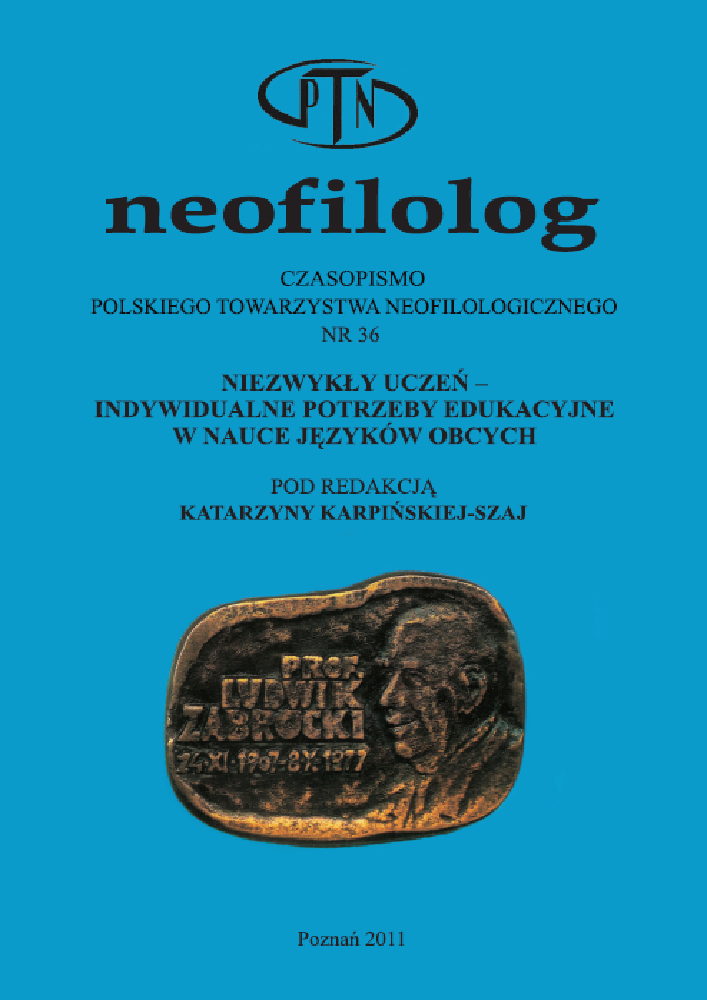Abstract
The paper is aimed at the identification of the environmental factors which have the most significant impact on the level of teenagers‟ compe-tence in foreign languages. The main goal is to determine whether school is capable of reducing the impact of adverse social background on achievement in learning a foreign language. The first part of the article is focused on the theoretical aspects of socialization related to the process of learning and provides an overview of research connected with the sub-ject. The second part presents the tools, procedures and findings of the author‟s own research project.
References
Baumert, J., Artelt, C., Klieme, E., Neubrand, M., Prenzel, M., Schiefele, U., Schneider, W., Tillmann K.-J., Weiß, M. 2002. PISA-2000 – Die Länder der Bundesrepublik Deutschland im Vergleich. Leske und Budrach: Opladen
Borowicz, R. 1988. Równość i sprawiedliwość społeczna. Studium na przykładzie oświaty. Państwowe Wydawnictwo Naukowe: Warszawa.
Borowicz, R. 2000. Nierówności społeczne w dostępie do wykształcenia. Casus Suwalszczyzny. Wszechnica Mazurska: Olecko.
Bourdieu, P., Passeron, J.-C., 1970, 2006. Reprodukcja. Elementy teorii systemu nauczania tłum. E. Neyman Wydawnictwo Naukowe PWN: Warszawa.
Ellis, R., 2005, “Measuring implicit and explicit knowledge of a second language: A psy-chometric study”, Studies in Second Language Acquisition, 27. 141-172.
Harvey, L., Green, D. 2000. „Qualität definieren: Fünf verschiedene Ansätze”. w: Zeit-schrift für Pädagogik 41. Beiheft: Qualität und Qualitätssicherung im Bil-dungsbereich, S. 17-40.
Holder, M. 2005. Fähigkeitsselbstkonzept und Leistungsmotivation im Fremdsprachenun-terricht. Peter Lang: Berlin.
Hurrelmann, K. 2002. Einführung in die Sozialisationstheorie. Beltz Verlag: Wein-heim und Basel.
Janicka, M. 2008. „Wpływ środowiska społecznego i szkolnego na motywację do uczenia się języka niemieckiego (na przykładzie szkół gimnazjalnych na terenie województwa lubelskiego)”. w: Michońska-Stadnik A., Wąsik Z. (red.) Nowe spojrzenie na motywację w dydaktyce języków obcych T. 1. Wydawnictwo Wyższej Szkoły Filologicznej: Wrocław. 61-74.
Kawula, S. 2004. Człowiek w relacjach socjopedagogicznych. Szkice o współczesnym wychowaniu. Wydawnictwo Edukacyjne akapit: Toruń.
Komorowska, H. 1982. Metody badań empirycznych w glottodydaktyce. Państwowe Wydawnictwo Naukowe: Warszawa.
Kwieciński, Z. 1973. Poziom wiedzy uczniów a środowisko szkoły. Uniwersytet Mikołaja Kopernika: Toruń.
Kwieciński, Z. 2002. Bezbronni. Odpad szkolny na wsi. Wydawnictwo EDYTOR: Toruń.
Lange, E. 2005. Soziologie des Erziehungswesens. VS Verlag für Sozialwissenschaften: Wiesbaden.
Łobocki, M. 2006. Metody i techniki badań pedagogicznych. Oficyna Wydawnicza „IMPULS”: Kraków.
Neuenschwander, M. P. 2005. Unterrichtssystem und Unterrichtsqualität. Konturen einer Unterrichtstheorie für die Sekundarstufe und ihre empirische Bewährung. Haupt Verlag: Bern, Stuttgart, Wien.
Nowak, S. 2007. Metodologia badań społecznych. Wydawnictwo Naukowe PWN: Warszawa.
Olubiński, A. 2005. „Współpraca rodziny i szkoły jako funkcja życia społecznego”. w: Nyczaj-Drąg, M., Głażewski, M. (red.) Współprzestrzenie edukacji. Oficyna Wydawnicza „IMPULS”: Kraków. 77-86.
Pawlak, M., 2009. „Metodologia badań nad strategiami uczenia się języka obcego”. Neofilolog 32. 65-83.
Pfeiffer, W. 2001. Nauka języków obcych. Od praktyki do praktyki. Wagros: Poznań
Reich, K. 2004. Konstruktivistische Didaktik. Lehren und Lernen aus interaktionistischer Sicht. Luchterhand: München/Unterschleißheim.
Rolff, H.-G. 1980. Sozialisation und Auslese durch die Schule. Quelle und Meyer: Heidelberg.
Schröder, H. 2001. Didaktisches Wörterbuch. R. Oldenburg Verlag: München, Wien.
Schümer, G. 2004. „Zur doppelten Benachteiligung von Schülern aus unterprivi-legierten Gesellschaftsschichten im deutschen Schulwesen”. w Schümer, G., Tillmann K.-J., Weiß, M. (Hrsg.) Die Institution Schule und die Lebenswelt der Schüler. Vertiefende Analysen der PISA-2000-Daten zum Kontext von Schüler-leistungen. VS Verlag für Sozialwissenschaften: Wiesbaden. 73-114.
Szałek, M. 1992. Sposoby podnoszenia motywacji na lekcjach języka obcego. Wagros: Poznań.
Szałek, M. 2004. Jak motywować uczniów do nauki języka obcego. Motywacja w teorii i praktyce. Wagros: Poznań.
Tillmann, K.-J. 2004. Sozialisationstheorien. Eine Einführung in den Zusammenhang von Gesellschaft, Institution und Subjektwerdung. Rowohlt Taschenbuchverlag, Reinbek bei Hamburg.
Wild, E. 2001. „Familiale und schulische Bedingungen der Lernmotivation von Schülern”. w: Zeitschrift für Pädagogik 4/2001. 481-499.
Zimmermann, P., Spangler, D. 2001. „Jenseits des Klassenzimmers. Der Einfluss der Familie auf Intelligenz, Motivation, Emotion und Leistung im Kontext der Schule”. w: Zeitschrift für Pädagogik 4/2001. 461-479
License
Copyright (c) 2011 Monika Janicka

This work is licensed under a Creative Commons Attribution-NoDerivatives 4.0 International License.
Authors
Authors of texts accepted for publication in Neofilolog are required to complete, sign and return to the Editorial team’s office the Agreement for granting a royalty-free license to works with a commitment to grant a CC sub-license.
Under the agreement, the authors of the texts published in Neofilolog grant Adam Mickiewicz University in Poznań a non-exclusive, royalty-free license and authorize the use of Attribution-NoDerivatives 4.0 International (CC BY-ND 4.0) Creative Commons sub-license.
The authors retain the right to the free disposal of the work.
Users
Interested Internet users are entitled to use works that have been published in Neofilolog since 2017, under the following conditions:
▪ attribution – obligation to provide, together with the distributed work, information about the authorship, title, source (link to the original work, DOI) and the license itself.
▪ no derivatives – the work must be preserved in its original form. Without the author's consent, it is not possible to distribute the modified work in the form of translations, publications, etc.
Copyrights are reserved for all texts published since 2017.
Miscellaneous
Adam Mickiewicz University in Poznań retains the property right as a whole (layout, graphic form, title, cover design, logo etc.).
